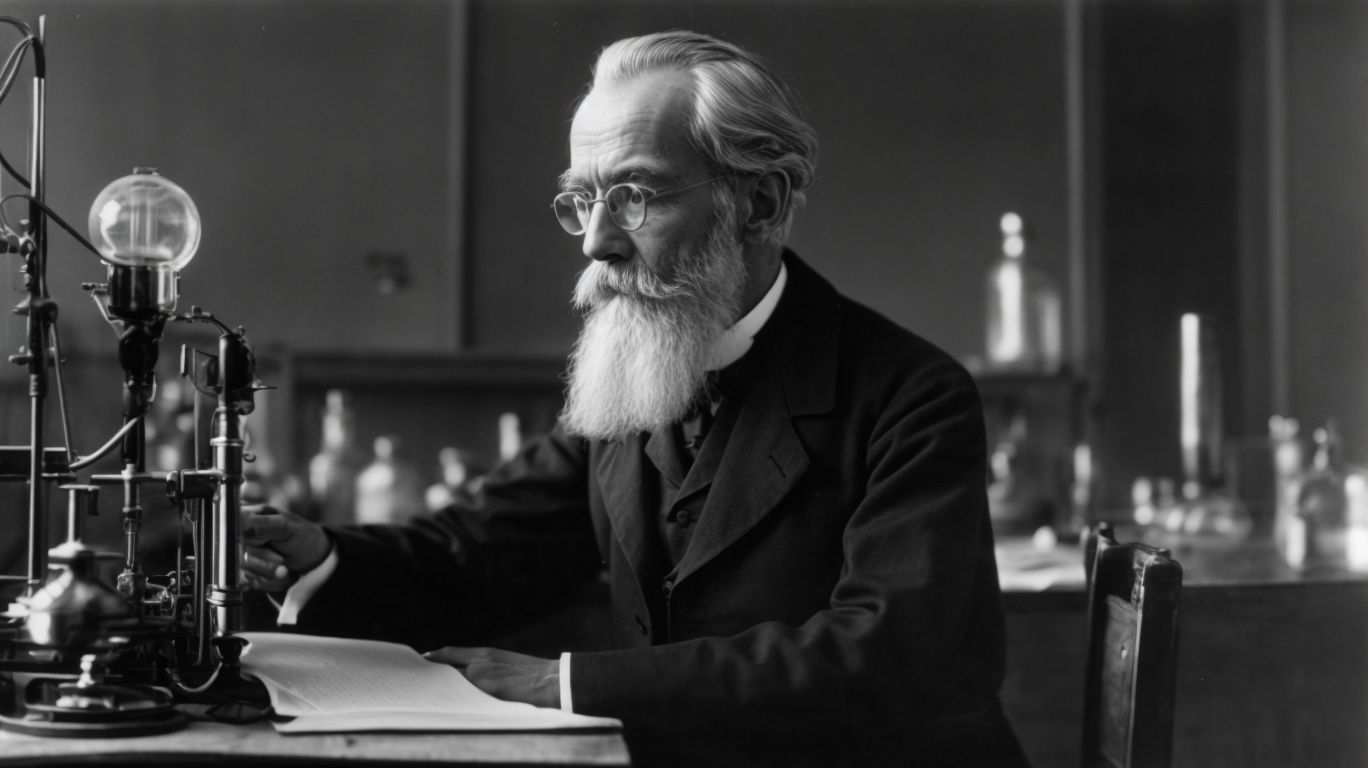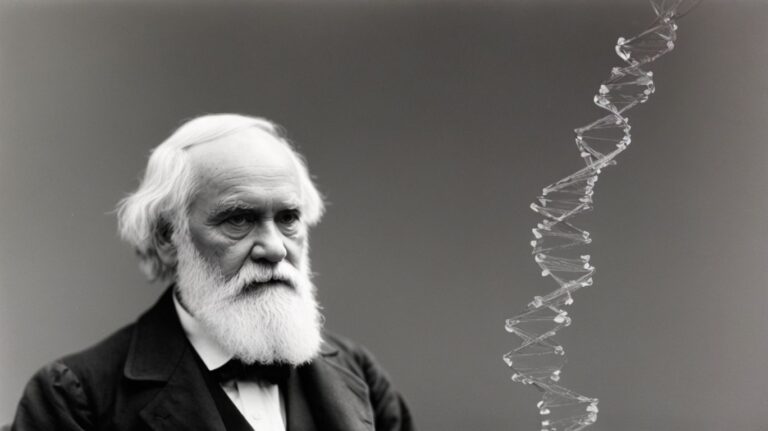Wilhelm Wundt is a significant figure in the field of psychology. He is known for establishing the first psychology laboratory and developing the concept of structuralism. His introduction of introspection and formation of the first psychology journal have had a lasting impact on the study of consciousness and the emergence of different schools of thought in psychology.
However, Wundt also faced criticisms. Some questioned the limitations of introspection as a method and the controversy surrounding structuralism. Despite these criticisms, Wundt’s legacy continues to influence psychology today.
Contents
- 1 Key Takeaways:
- 2 Who is Wilhelm Wundt?
- 3 What is Wundt’s Contribution to Psychology?
- 4 How Did Wundt’s Ideas Impact Psychology?
- 5 What Criticisms Did Wundt Face?
- 6 What is Wundt’s Legacy in Psychology Today?
- 7 Frequently Asked Questions
- 7.1 What is Wilhelm Wundt’s contribution to the field of psychology?
- 7.2 How did Wilhelm Wundt’s approach to psychology differ from previous theories?
- 7.3 What was the impact of Wilhelm Wundt’s work on the development of psychology as a scientific discipline?
- 7.4 What were some key findings from Wilhelm Wundt’s experiments?
- 7.5 How did Wilhelm Wundt’s theories influence modern psychology?
- 7.6 Was Wilhelm Wundt’s work met with any criticism or controversy?
Key Takeaways:
- Wilhelm Wundt is considered the founder of modern psychology due to his pioneering work in establishing the first psychology laboratory.
- Wundt’s contributions to psychology include the development of structuralism, introspection as a method, and the formation of the first psychology journal.
- Wundt’s ideas had a significant impact on psychology, influencing its development as a science, the study of consciousness, and the emergence of different schools of thought.
Who is Wilhelm Wundt?
Wilhelm Wundt, known as the ‘Father of Psychology’, was a German scientist and academic who is credited with establishing the field of scientific psychology as a separate and distinct science, separate from philosophy and with a focus on the conscious mental states.
Wilhelm Wundt was born in a small town in Germany in 1832 and showed a strong interest in science from a young age. He received a diverse education, attending the University of Tübingen, University of Heidelberg, and University of Berlin. His focus was on physiology and philosophy, which would later play a crucial role in his contributions to psychology.
In 1879, Wundt established the first experimental psychology lab at the University of Leipzig, a significant milestone in the field of psychology.
Through this lab, he conducted numerous experiments and observations to better understand consciousness and the human mind. He also placed great importance on introspection as a method for studying conscious mental states, a revolutionary concept at the time.
What is Wundt’s Contribution to Psychology?
Wilhelm Wundt made significant contributions to psychology, including the establishment of the first psychology laboratory, the development of structuralism, the introduction of introspection, and the formation of the first psychology journal.
Establishment of the First Psychology Laboratory
Wilhelm Wundt is renowned for establishing the first experimental psychology laboratory, a groundbreaking initiative that laid the foundation for scientific inquiry into conscious mental states.
This milestone in the history of psychology marked a paradigm shift, as Wundt’s laboratory sparked a new era of experimental research focused on understanding human consciousness, perception, and cognition.
His emphasis on introspection as a method for studying mental processes fostered the development of an objective and systematic approach to the exploration of the human mind.
Wundt’s innovative techniques and dedication to empirical investigation set the stage for the emergence of experimental psychology as a distinct scientific discipline, shaping the future of psychological research and advancing our understanding of the complexities of human experience.
Development of Structuralism
Wundt’s development of structuralism involved the analysis of the basic elements that constitute the human mind and the belief that consciousness could be broken down and reduced to these fundamental elements.
This approach sought to uncover the structure of the mind through systematic introspection, where individuals were asked to describe their conscious experiences in response to specific stimuli.
Wundt’s emphasis on introspection as a method of exploring consciousness was a fundamental aspect of his structuralist approach.
He aimed to identify the elemental sensations, feelings, and images that formed the building blocks of human consciousness, ultimately striving for a systematic understanding of the human mind.
Introduction of Introspection
Wundt’s introduction of introspection as a fundamental tool in psychological experimentation marked a significant shift in the study of conscious mental states, positioning introspection as a scientific method for understanding the human mind.
This method involved trained individuals reporting their conscious experiences in response to specific stimuli, aiming to uncover the basic building blocks of conscious experience and mental processes.
Wundt’s emphasis on rigorous observation and systematic analysis paved the way for future advancements in the scientific study of the mind, laying the foundation for experimental psychology as a discipline.
Formation of the First Psychology Journal
Wundt’s formation of the first psychology journal was a significant milestone in the dissemination of psychological theories and research, contributing to the academic development and recognition of psychology as a separate and distinct science.
This groundbreaking initiative led to a platform for scholars to share their findings, debate theoretical frameworks, and solidify the foundations of psychological inquiry.
As the journal gained prominence, it attracted contributions from leading psychologists, fostering the growth of rigorous scholarship and shaping the academic discourse within the field.
The systematic publication of research articles and theoretical expositions not only elevated the status of psychology as a discipline but also provided a catalyst for the establishment of academic standards and methodologies in scholarly publishing.
How Did Wundt’s Ideas Impact Psychology?
Wundt’s ideas profoundly influenced the development of psychology as a science, particularly in the study of consciousness and the adoption of introspection as a scientific method for examining conscious mental states.
Influence on the Development of Psychology as a Science
Wundt’s influence on the development of psychology as a science was profound, as he advocated for an experimental approach to the study of consciousness, laying the groundwork for psychology’s evolution as a scientific discipline.
By emphasizing the use of experimental methods to investigate mental processes, Wundt paved the way for future psychologists to adopt a more scientific and systematic approach.
His advocacy of the experimental approach brought about a paradigm shift in the field, steering it away from introspective methods towards an objective and empirical framework.
The rigorous experimentation and data collection techniques introduced by Wundt set the standard for the scientific investigation of consciousness, influencing generations of psychologists to come.
Influence on the Study of Consciousness
Wundt’s ideas had a profound influence on the study of consciousness, particularly through his advocacy for introspection as a scientific method, shaping the scientific exploration of conscious mental states.
His emphasis on introspection revolutionized the way psychologists approached the study of consciousness.
By proposing that individuals engage in self-observation to discern their own thoughts and emotions, Wundt established a foundation for investigating the depths of human consciousness.
This approach allowed researchers to delve into the intricacies of conscious experiences and paved the way for a more rigorous and structured examination of conscious mental states.
Wundt’s contributions to the scientific study of consciousness through introspective methods remain fundamental to the field of psychology.
Influence on the Emergence of Different Schools of Thought
Wundt’s ideas played a pivotal role in the emergence of different schools of thought within psychology, particularly with the establishment of structuralism and the foundations of experimental psychology.
The emphasis on introspection and the study of conscious experiences, central to the structuralist approach, shaped the early development of the field.
Wundt’s focus on experimental methods laid the groundwork for the rise of experimental psychology, influencing future research and practice.
His impact extended to the diversification of psychological theories, providing a framework for the exploration of human behavior and cognition through various lenses, contributing substantially to the evolution of psychological thought.
What Criticisms Did Wundt Face?
Wundt faced criticisms related to the limitations of introspection as a method, controversies surrounding structuralism, and objections to his exclusion of women from his laboratory.
Limitations of Introspection as a Method
Wundt’s method of introspection faced criticisms due to perceived limitations in its scientific rigor and potential biases in subjective self-observation, leading to debates about its reliability as a method for studying mental processes.
One primary criticism of introspection is its subjective nature, which makes it difficult to standardize and replicate, thus posing challenges to its scientific validity.
Critics argue that the reliance on individual subjective experiences may lead to inconsistent findings, hindering the establishment of reliable psychological principles and theories.
Concerns about introspective biases have been raised, as individuals may unknowingly alter their self-observations to align with prevailing societal or cultural norms, impacting the accuracy and objectivity of the data obtained.
Controversy Surrounding Structuralism
Wundt’s structuralist approach sparked controversy within the field of psychology, as critics questioned the reduction of consciousness to basic elements and the limitations of this reductionist perspective.
This reductionist perspective led to debates about whether it truly captured the richness and complexity of human consciousness.
Critics argued that such reductionism overlooked the dynamic, interconnected nature of conscious experience, emphasizing the need for a more holistic understanding of the mind.
The validity of Wundt’s principles has been scrutinized in the context of modern advancements in neuroscience and cognitive psychology, bringing into question the applicability of his theories in light of contemporary research.
Criticism of His Exclusion of Women from his Laboratory
Wundt faced criticisms for the exclusion of women from his laboratory, raising ethical and gender-inclusivity concerns within the academic and scientific community.
This exclusionary practice sparked debates about the representation and participation of women in the emerging field of psychology. Critics argued that such practices hindered the diverse perspectives and potential contributions of women to the scientific discourse.
The implications of Wundt’s actions were not only ethical but also had profound consequences for the advancement of scientific knowledge, given the exclusion of a significant portion of the population from engaging in academic pursuits.
The controversy surrounding gender representation continues to shape discussions about inclusivity in modern educational and research environments.
What is Wundt’s Legacy in Psychology Today?
Wundt’s legacy in psychology today encompasses his enduring contributions to the field, shaping the trajectory of psychological inquiry and laying the groundwork for diverse perspectives and methodologies in contemporary psychology.
Frequently Asked Questions
What is Wilhelm Wundt’s contribution to the field of psychology?
Wilhelm Wundt is considered the founder of modern psychology, as he established the first experimental psychology laboratory in 1879 in Leipzig, Germany. He is also credited with developing the method of introspection, which is the process of examining one’s own thoughts and feelings to understand the human mind.
How did Wilhelm Wundt’s approach to psychology differ from previous theories?
Before Wundt, psychology was primarily focused on philosophy and speculation, but he believed in the importance of using scientific methods to study the mind. He believed that psychology should focus on studying conscious mental processes and that these processes could be broken down into basic elements.
What was the impact of Wilhelm Wundt’s work on the development of psychology as a scientific discipline?
Wundt’s work laid the foundation for modern psychology and significantly influenced the development of the field. He introduced the concept of structuralism, which focused on analyzing the basic elements of consciousness, and this approach paved the way for other schools of thought, such as behaviorism and functionalism.
What were some key findings from Wilhelm Wundt’s experiments?
Wundt conducted various experiments in his laboratory, including reaction time experiments and perception experiments. Some of his key findings include the idea that the mind can be broken down into basic elements and that these elements can be studied using introspection. He also discovered the concept of apperception, which refers to the process of organizing and making sense of sensory information.
How did Wilhelm Wundt’s theories influence modern psychology?
Wundt’s theories and methods have had a lasting impact on modern psychology. His emphasis on using scientific methods to study the mind laid the foundation for the development of different schools of thought and approaches to psychology. Additionally, his work on consciousness and introspection paved the way for the study of cognitive psychology.
Was Wilhelm Wundt’s work met with any criticism or controversy?
While Wundt’s contributions to psychology were groundbreaking, his ideas were not without criticism. Some psychologists disagreed with his concept of introspection, arguing that it was subjective and unreliable. Additionally, Wundt’s focus on the individual experience was criticized for neglecting the importance of social and cultural influences on behavior. However, his work remains influential and highly regarded in the field of psychology.



